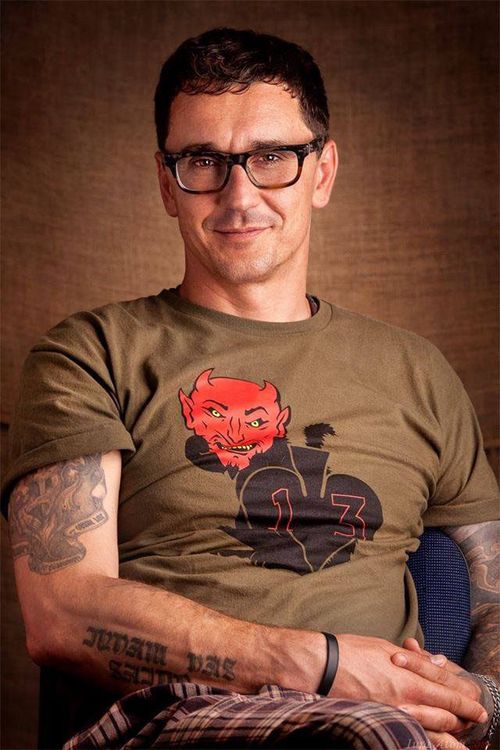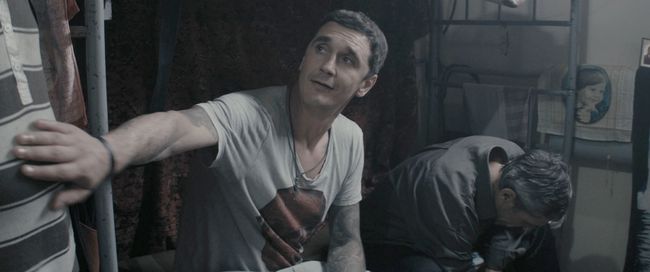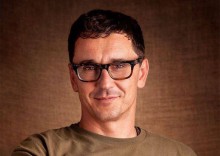Alisa Pavlovska, a young Ukrainian film director, titled her new production “Fifth Therapy.” Recently screened, the title has left many wondering. It is based on a series of autobiographic short stories by Stas Dombrovskyi, ex-drug addict and con. Born in Odesa, February 21, 1979, he was 17 when he discovered he was afflicted with AIDS. He has served several prison terms totaling 11 years and was a textbook addict. He has managed to kick the habit for the past five years and published a collection of verse and prose. He is Odesa’s public and political activist with a Facebook blog. He has also been active in journalism. He is married and has two children. “Fifth Therapy” is his debut as script writer and actor. When making the film, the cast included professional actors and people who had actually taken parts in the events included in the script. What makes this production very special is the fact that practically all characters didn’t have to impersonate anyone except themselves.
It would be wrong to describe this production as another film noir. Indeed, it has scenes with syringes being emptied into veins, junkies’ lairs littered with empty disposable syringes in Odesa, packed prison cells, and hospital rooms with terminal AIDS patients. One sees the daily realities of those this society has dumped and doomed to slow death, relying on the good old principle: No man, no problem.
Dombrovskyi and Pavlovska try to convince the viewer that there is hope even for those in the lower depths. This takes both personal and public effort. Society must remember that all these outcasts are simply unlucky communal members.
Dombrovskyi is a case study in personal miraculous luck. Despite some shortcomings in direction and acting, the “Fifth Therapy” conveys its key message: miracles and salvation are possible.

Below is an interview with Stas Dombrovskyi shortly after the premiere.
PROFESSIONAL RECOVERY
How did this movie come to be?
“After watching Alisa Pavlovska’s first production ‘I Don’t Want to Die’ (about her friend Stas Podlypskyi), I thought I was also a diehard and my story was as good. I offered it to Alisa. Her first reaction was to tell me to shove it. A year passed, we met. I was then posting short essays on Facebook, concerning my past. We used them, wrote a script, and started on a movie.”
Was it hard to impersonate yourself?
“Mine is a professional recovery case. I’m working on it using a 12-step program. It has the notion of ‘sponsor’ – a person who has been sober longer than I have. I can call that person any time to share my problems and receive recommendations. I was told that I should relieve my part in the script not as an actor, but as a psychological drama – that I had to relive 20 years in a couple of months. I did and I could see my old self with my new sober one.”
Is there a big difference between what is in the movie and what you have experienced?
“My life is one thing, my book is another thing, and the movie is still another thing. What you watch on screen reflects about half of what has actually happened. There is one major scene we kept as close to reality as absolutely possible – when I see myself through my mother’s eyes. Love can be tough, especially when your mom spits you in the face... Such program elements did work in my case.”
ROBBING AND WRITING
Why did you start to write?
“I was fond of reading books. In fact, my family was in a readers’ club and we had a big home library. My parents were theatergoers. I grew up watching plays and movies, and reading a lot. I’d always wanted to write myself. I started by plagiarizing prose writers, like Erich Maria Remarque with his poetic style. I used their plots to write my verse. Then I came across the Metarealists and altered my style, I started writing like Brodsky, Mayakovski, and Yesenin. I painted and wrote. That was an outlet [for my creative emotions].”
When did you embark on the criminal path?
“You can see it, watching the movie. I was a six-year kid when I walked into an empty garage and saw an old Zhiguli car, also a knapsack and a gold watch. At the time, I had no notion that one shouldn’t take anything that belonged to someone else. I took the watch and left... I’d been dreaming of traveling for so long – like boarding a train for Vinnytsia [in west-central Ukraine] and going to Africa, with my friends. And so I returned to take the knapsack, but the cops were waiting. That was my first time.”
How did you manage to combine writing with that kind of extreme lifestyle?
“In my case, crime and drugs weren’t lifestyle but an escape from reality. I think the reason was my family, the destructive relationship between my father and mother. How I combined? Creativity can be an acceptable criminal act. I wrote and I stole and robbed. That was my creativity at the time. I didn’t need extra money. My family was well provided for by the state. I did it because it was cool – except that my emotions were aimed in the wrong direction. Instead of writing verse or painting a picture inspired by anger, I’d vent it on fellow humans, mugging them, stealing what they had on them. I was 14 when I was sentenced to 1.5 years after stealing a wallet and a violin. Was one day spent behind bars worth that wallet? And I started by stealing books. I’d read them and then sell them to the book vendors. In short, creativity can be a crime perpetrated with a plus sign, and asocial behavior can be a work done with a minus sign.”
Is it true that many convicts take to writing?
“It is. It’s also true that quite a few cons take to reading. A true criminal is one with a concise Brockhaus and Efron Encyclopedic Dictionary and Great Soviet Encyclopedia in his head. The worse the crime committed, the higher the skill it takes to justify it. Our ‘thieves in law’ usually know 17 languages each – except their mother tongue. They exercise intellect while in custody, in order to conceal their actual conduct.”
PUNITIVE, NOT CORRECTIVE SYSTEM
Serving a term doesn’t correct, does it?
Fyodor Dostoevsky wrote that the penitentiary system sucks you dry of all life juices, producing a living mummy with dried-out brains, claiming it as an example of full confession and complete correction. It all depends on how we feel about it. I now have two healthy children. I would’ve never had them without the HIV experience. It worked as a plus for me, as did my prison terms. I sincerely believe that I would’ve died of OD in the street, hadn’t I been in prison. I’ve seen ex-cons become MPs and writers. I’ve seen cons who hanged themselves. Our system is punitive, not corrective. It’s all geared to make one suffer and turn into a vegetable. A closer look, however, shows that 99 percent of the convicts are sick. How can you consider one to be healthy after stealing the same motorcycle frame for the fifth time? This is a self-destruct syndrome. There are no real criminals among the inmates, because they buy their freedom for $1,000 a year, so each case is ‘solved’ very easily.”

DRUG ADDICTION: PREDETERMINED SUICIDE
There are quite a few religious organizations that are taking care of drug addicts. Does this kind of rehabilitation help?
“It didn’t help me. Let me tell you something. I regard religion pretty much the same as I do drugs. I reject it, period. Religious addiction doesn’t mean recovery. Stas Podlypskyi was dying in the street and I had no choice, I sent him to a religious center in Novosibirsk. That way he’d change drug addiction for the religious one. He is now a preacher. I just wanted him to live.”
Why is the drug addiction recovery percentage so low?
“Because these people don’t want to live. Drug addiction is a desire to kill yourself simply because you realize that you are scum. You just can’t accept this scum in yourself. A mere three percent recover and the rest consciously follow the deadly road to the end. Back in 2007, I was released from jail being formally near my death. I’d keep on the needle for some five years afterward and served another 1.5-year term. I began to recover in 2013. What was it other than suicide?”
It starts as an attempt to satisfy oneself beyond all dreams, doesn’t it?
“No, it’s an attempt to escape from oneself. We are simple mortals, but we have that special trait. We want to be either saints or devils, but never what we really are: simple mortals. We escape realities by taking to psychotropic drugs, sex, and gambling. It’s easier to get plastered than face yourself and answer all those unpleasant questions – as in Sergei Yesenin’s poem ‘The Black Man’ with that shattered mirror.”
How is drug addiction being dealt with now?
“There is no official rehabilitation program for the ATO veterans with the posttraumatic syndrome. What do you expect for the junkies? It’s easier for the authorities to assign substitution therapy and have them killed under the law, rather than work out a government program, like the US Alcoholics Anonymous. Our authorities don’t need it, it’s inconvenient. Why do you think ‘Fifth Therapy’ wasn’t screened in Mykolaiv, Ukraine’s number one addicted city? Because no one was interested. They are making big money using the addicts, they aren’t interested in people with a clean bill of health. Why should they have people with clear heads at all? Such people can’t be kept under control.”
IDENTIFYING ONESELF WITH ONE’S COUNTRY
What are your plans?
“I have a script ready. It’s about Viktor Kulivar, a spectacular criminal who was known in Odesa under his alias Karabas. He would enter any office, in any corridor of power, yet he’d refuse to be made ‘officially’ known in the underworld. He was in charge of that underworld’s ‘system of justice.’ He was cruel and just at the same time, yet he was human. He was another Benya Krik [Bennie the Howl]. My hero is looking for funds to make his movie about Viktor Kulivar and get some dividends. He finds them, but realizes that this money is from the people who killed Karabas. Man can be killed twice – first, by making him a dead body, and second, by killing his spirit, making him a hero. This film director decides that Viktor Kulivar is not to suffer his second death – but those who are paying for his production decide differently and kill the film director. At this point, however, we’re witness to the birth of a soul. I hope it will be an existential drama with all the action and thriller frills.”
You say there are people who are maintaining some kind of order, relying on their own eminence grise possibilities. Do you think that justice can be established under the law in Ukraine?
“I do, because I believe in Ukraine implicitly. It will come at a very dear price. It will take time, but we are on the road. I started recovering shortly before the Maidan. I identify myself with the country I live in. Watching all this, I tell myself that I can live under the law. Why do I treat Viktor Kulivar with respect? He would try to stay humane despite the horrible circumstances, he always would. What is important now isn’t flag-waving patriotism but remaining a true humane Ukrainian.”








